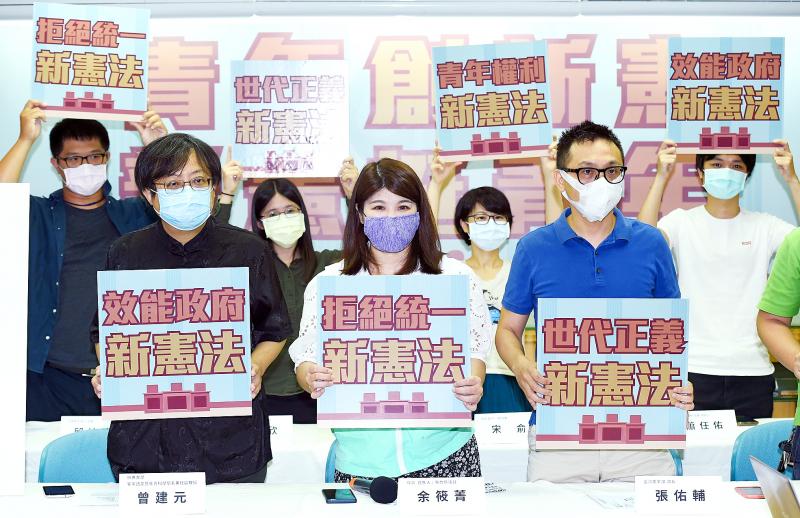The Green Party Taiwan has begun gathering signatures for a petition to hold a referendum on whether lawmakers should amend the Additional Articles of the Constitution to better reflect the “current needs” of the nation.
The referendum question proposed by the party would ask voters if they agree that an article should be added to the Act Governing the Legislative Yuan’s Power (立法院職權行使法) stipulating that members of the 10th Legislative Yuan should before May 20, 2022, review and pass an amendment to the additional articles to replace “to meet the requisites of the nation prior to national unification” with “to meet the current needs of the nation,” and then, according to procedures described in Article 12 of the additional articles, hold a referendum on the constitutional amendment.
The 10th Legislative Yuan is the current term.

Photo: Liao Chen-huei, Taipei Times
Taiwan should “cut its legal relationship with China,” Green Party Taiwan convener Yu Hsiao-ching (余筱菁) told a news conference in Taipei yesterday.
China has continued to suppress Taiwan globally, which has left the nation unable to “participate normally in international society” and negatively “affected the survival and development of Taiwanese,” she said.
The Constitution in its current form “is not a constitution that represents Taiwan,” Yu said. “This Constitution has never applied to Taiwan’s current situation.”
The young generation needs a new constitution, Green Party Taiwan Secretary-General Rita Jhang (張竹芩) said.
By the end of this month, the party expects to reach the signature threshold for the first stage of the proposed referendum — one-10,000th of the total electorate in the most recent presidential election — as stipulated by the Referendum Act (公民投票法), she said.
Based on Central Election Commission data showing that there were about 19.31 million eligible voters in the Jan. 11 presidential election, the party would need to collect roughly 1,931 signatures to pass the initial threshold to launch the referendum.
The party was asked to comment on President Tsai Ing-wen (蔡英文) saying in her second inaugural address on May 20 that she would continue to handle cross-strait affairs according to the Constitution and the Act Governing Relations Between the People of the Taiwan Area and the Mainland Area (臺灣地區與大陸地區人民關係條例).
“This has been our consistent position for maintaining the peaceful and stable ‘status quo’ in the Taiwan Strait,” Tsai said.
Yu said that the Green Party Taiwan supported Tsai in the election and could understand the president’s “more conservative” view on the matter.
However, the party still believes that Taiwan should draw a clear line regarding its relationship with China, she said.

A preclearance service to facilitate entry for people traveling to select airports in Japan would be available from Thursday next week to Feb. 25 at Taiwan Taoyuan International Airport, Taoyuan International Airport Corp (TIAC) said on Tuesday. The service was first made available to Taiwanese travelers throughout the winter vacation of 2024 and during the Lunar New Year holiday. In addition to flights to the Japanese cities of Hakodate, Asahikawa, Akita, Sendai, Niigata, Okayama, Takamatsu, Kumamoto and Kagoshima, the service would be available to travelers to Kobe and Oita. The service can be accessed by passengers of 15 flight routes operated by

GIVE AND TAKE: Blood demand continues to rise each year, while fewer young donors are available due to the nation’s falling birthrate, a doctor said Blood donors can redeem points earned from donations to obtain limited edition Formosan black bear travel mugs, the Kaohsiung Blood Center said yesterday, as it announced a goal of stocking 20,000 units of blood prior to the Lunar New Year. The last month of the lunar year is National Blood Donation Month, when local centers seek to stockpile blood for use during the Lunar New Year holiday. The blood demand in southern Taiwan — including Tainan and Kaohsiung, as well as Chiayi, Pingtung, Penghu and Taitung counties — is about 2,000 units per day, the center said. The donation campaign aims to boost

ENHANCING EFFICIENCY: The apron can accommodate 16 airplanes overnight at Taoyuan airport while work on the third runway continues, the transport minister said A new temporary overnight parking apron at Taiwan Taoyuan International Airport is to start operating on Friday next week to boost operational efficiency while the third runway is being constructed, the Ministry of Transportation and Communications said yesterday. The apron — one of the crucial projects in the construction of the third runway — can accommodate 16 aircraft overnight at the nation’s largest international airport, Minister of Transportation and Communications Chen Shih-kai (陳世凱) told reporters while inspecting the new facility yesterday morning. Aside from providing the airport operator with greater flexibility in aircraft parking during the third runway construction,

American climber Alex Honnold is to attempt a free climb of Taipei 101 today at 9am, with traffic closures around the skyscraper. To accommodate the climb attempt and filming, the Taipei Department of Transportation said traffic controls would be enforced around the Taipei 101 area. If weather conditions delay the climb, the restrictions would be pushed back to tomorrow. Traffic controls would be in place today from 7am to 11am around the Taipei 101 area, the department said. Songzhi Road would be fully closed in both directions between Songlian Road and Xinyi Road Sec 5, it said, adding that bidirectional traffic controls would